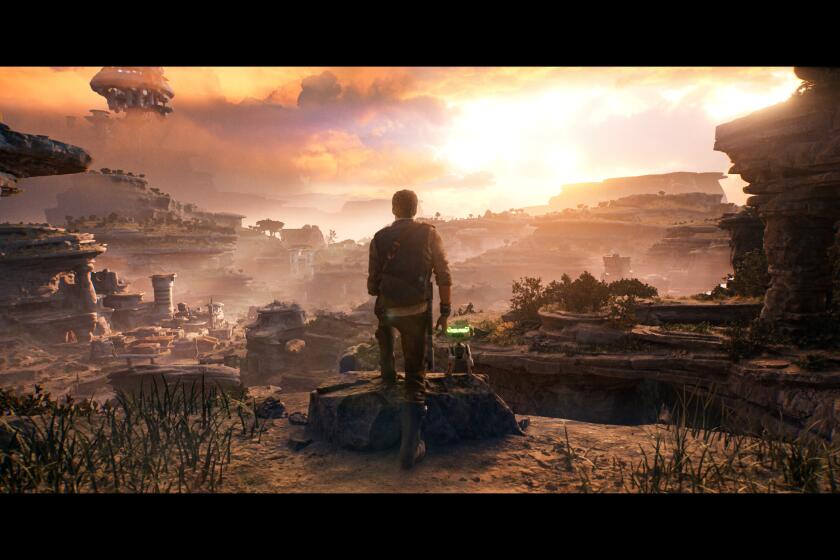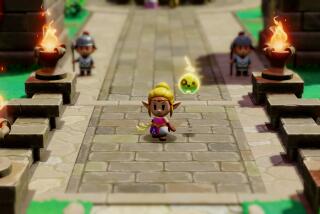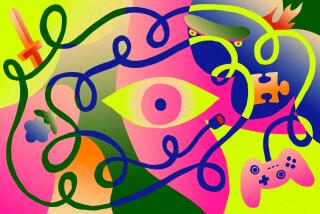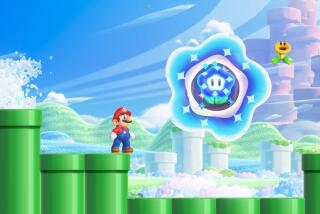Review: ‘The Legend of Zelda: Tears of the Kingdom’ is video game bliss
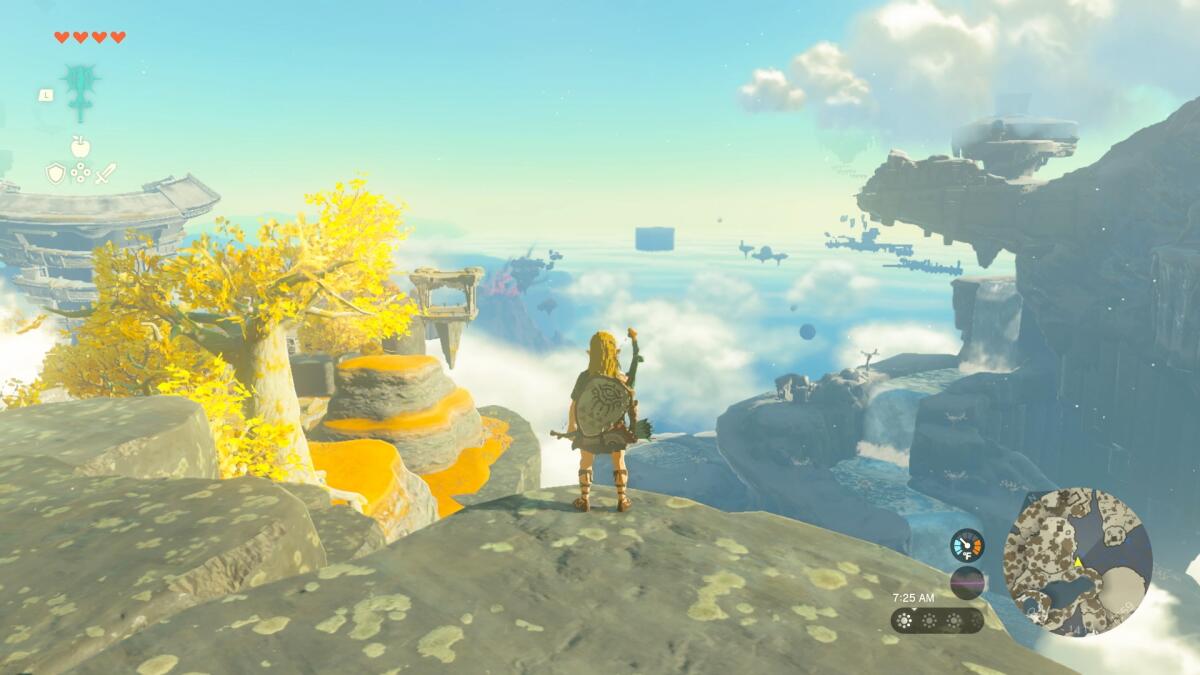
- Share via
It starts with an archaeological mission. A so-called gloom — a scorching red mist that seems to have risen from the depths of the earth — is believed to be the cause of a widespread sickness. For just a few minutes, “The Legend of Zelda: Tears of the Kingdom,” the most anticipated game of the year, will guide players by the hand, taking them down into the caverns beneath a medieval castle.
Zelda here, all braided golden hair and enchanting oval eyes, is a leader and a scholar. She’s directing Link, the voiceless video game hero who has come to her rescue many a time since the mid-1980s, to follow her lead and walk in the shadow of her torch. These tunnels, Zelda tells us, have long been forbidden, forever off-limits even to princess royalty such as her. “I can’t tell you how excited I am,” Zelda exclaims, before pulling out a smartphone-like device to snap photos of ancient hieroglyphics believed to depict the founding of the kingdom of Hyrule.
For a fleeting moment, the gloom seems a distant memory. But these catacombs are home to more than “The Legend of Zelda” lore. This patient, cinematic beginning is building a mystery, giving us glimpses of Link’s magical Master Sword but never letting us attack with it. We hear of an advanced and ancient sky civilization, a great war and a demon king, and we know, partly because a new “Zelda” game arrives every few years and partly because of the ominous, stark soundtrack — a chilling sound that seems fashioned out of whooshing weapons — that history is about to repeat itself.
And yet “Tears of the Kingdom” is not a game of familiarity. The follow-up to the landmark 2017 Nintendo Switch launch title “Breath of the Wild,” which has globally sold nearly 30 million copies, “Tears of the Kingdom,” out Friday, takes what for many will be the recognizable setting of that title and completely upends it. Don’t be surprised by the extended, plot-heavy start. Zelda and Link soon stumble upon a suddenly awakened corpse, and whether this monstrosity is trapped or simply waiting to be aroused is unknown at this point, but all of Hyrule will soon be subject to a series of cataclysmic events.
“Tears of the Kingdom” simply has to make a mess for Link to run around in. A mess? No, more like a playground. “Tears of the Kingdom” is a game of pure curiosity and discovery, one that rewards players for constantly asking, “What if?” Building upon the try-anything sensibility of “Breath of the Wild,” “Tears of the Kingdom” adds a host of new tricks for Link that encourage players to manipulate environments, create odd contraptions, rewind time and soar through ceilings. There were moments when puzzles stumped me, but that’s only because there’s rarely one solution in “Tears of the Kingdom.” Or I simply momentarily forgot all that was in Link’s toolbox.
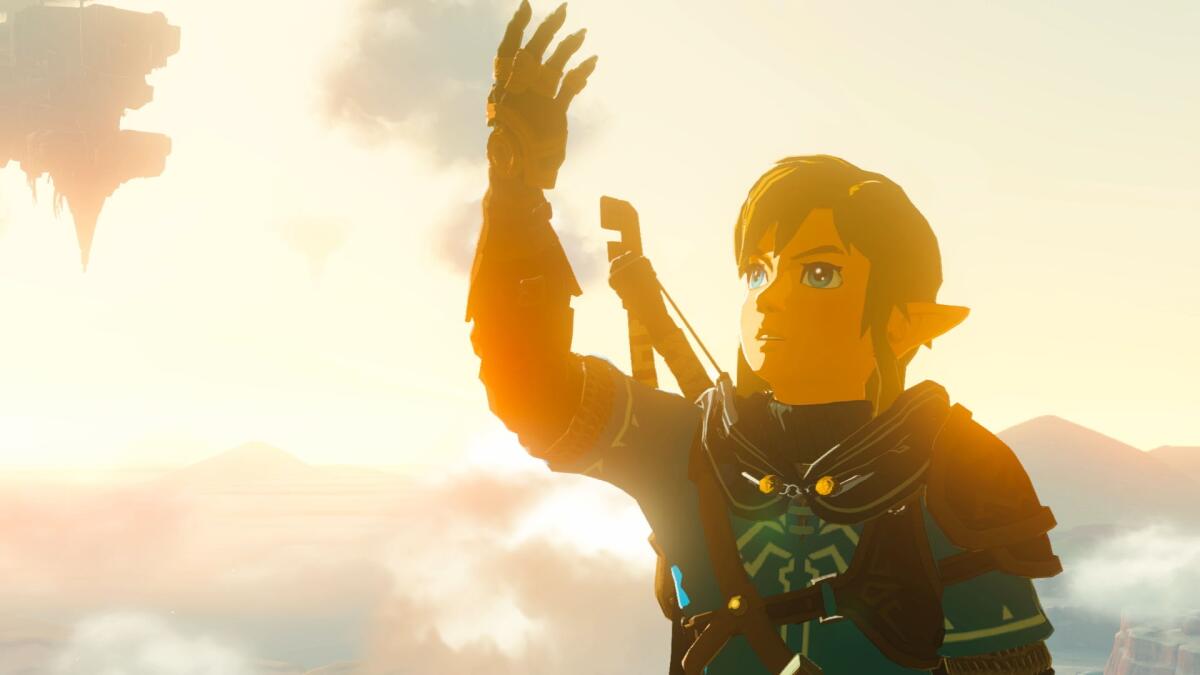
More so than any adventure game I’ve played, “Tears of the Kingdom” isn’t asking players to complete or solve tasks; the game encourages creativity. Moving through its giant, beautiful world — one of floating green islands and underground caves that beg to be illuminated to unlock a host of subtle colors — what will likely be the biggest game of 2023 is also one of the finest.
“Zelda” games have long grown with the video game medium, outlining for the industry how we move, battle and puzzle-solve in interactive spaces, first in 8-bit worlds and now expansive 3-D universes. Link has been a character of transformation, a cipher for new ways to play — at times he’s donned metamorphosing masks or mutated into paint on a wall — and all the while “Zelda” games have tinkered with the balance between narrative and gameplay. While “Zelda” history over the last 35-plus years has grown vast and can be somewhat convoluted for those who want to be completists, individual games never feel daunting.
“Tears of the Kingdom” has an especially approachable story. After disturbing the ghostly, mummified corpse beneath the castle, Zelda and Link are defeated — Link’s magic sword seemingly destroyed and lost — while the floor opens up. The game leaves us only with questions. Why has Link then awakened in a kingdom in the sky? Where did Zelda disappear to? She appears to be safe, as we hear her speak to us throughout the game, but why, when she materializes, does she seem to disappear in a blast of light? For much of the game — I’ve logged about 40 hours with “Tears of the Kingdom” — the feel is less about hunting a big evil and more about simply trying to find answers.
And conundrums abound. Link’s arm, scorched dead by the reanimated corpse, is replaced and transformed in the sky kingdom by what is presented as a godly species known as the Zonai. What’s important to know is that we don’t know much about the Zonai — their existence is one of the game’s central questions — only that now Link’s arm has magical abilities. The primary skill is called “ultrahand,” which will allow Link to fuse together many of the items found throughout the game. Upon leaving the sky kingdom and instructed to head toward central Hyrule, I spent a solid hour or two trying to build a rolling house. It wasn’t necessary to do, but its walls kept some enemy arrows from finding Link’s skin.
‘Star Wars Jedi: Survivor’ is a video game that feels like a ‘Star Wars’ greatest hits package. It also makes the argument that the Jedi are what make the franchise special.
Crafting is typically my least favorite video game activity, but “Tears of the Kingdom” has found a clever solution. Link simply points and selects two objects, and they’re instantly stitched together. This turns the entire game world into something that feels malleable. What in most games is a chore here is simply an act of visual invention. Environmental clues may key us in on what needs to be done — a lone sail may sit in a field next to a lake, for instance, suggesting we find a way to make a boat — but the feel is as if all of Hyrule is a canvas.
Sometimes I got overzealous. In what I at first thought was a particularly challenging puzzle inside a shrine, I spent about four hours constructing a makeshift, lifesize pinball game, realizing only later I was making the solution more complex than it needed to be. There’s no hand-holding at the start of “Tears of the Kingdom,” but the game will politely nod toward potential solutions. Need to find a way across two sky islands? Chances are Link will stumble upon an ax, which could be used to chop down trees. The ultrahand ability can then combine logs to have a makeshift bridge.
In this way, “Tears of the Kingdom” felt like it was dedicated solely to player curiosity. It’s a Nintendo tradition since master game designer Shigeru Miyamoto, the creator of the original “Zelda” game, first gave players control of a character named Mario and asked them to find out what happens if they punch a block or pounce on a walking mushroom-like character. Link can do quite a bit in “Tears of the Kingdom,” such as briefly rewinding time on certain objects or rising through ceilings. Weapons, as in “Breath of the Wild,” degrade quickly, but Link can now use an ability called “fuse” to stick other objects onto them, increasing their strength or turning them into something else entirely.
Sometimes we need to attach a fan to a log to create a sudden speedboat. Once, when armed with little more than an unlit torch, I bested some enemies who clearly had me overmatched by fusing a giant iron ball onto that flimsy piece of wood, the very iron ball they tried to squash me with by rolling it down a ramp. I’m not the most coordinated of gamers, but I appreciate that “Tears of the Kingdom” allows me to approach everything like a puzzle. My dodging skills are weak, but often there’s something in the environment to meld or manipulate to give Link an upper hand.
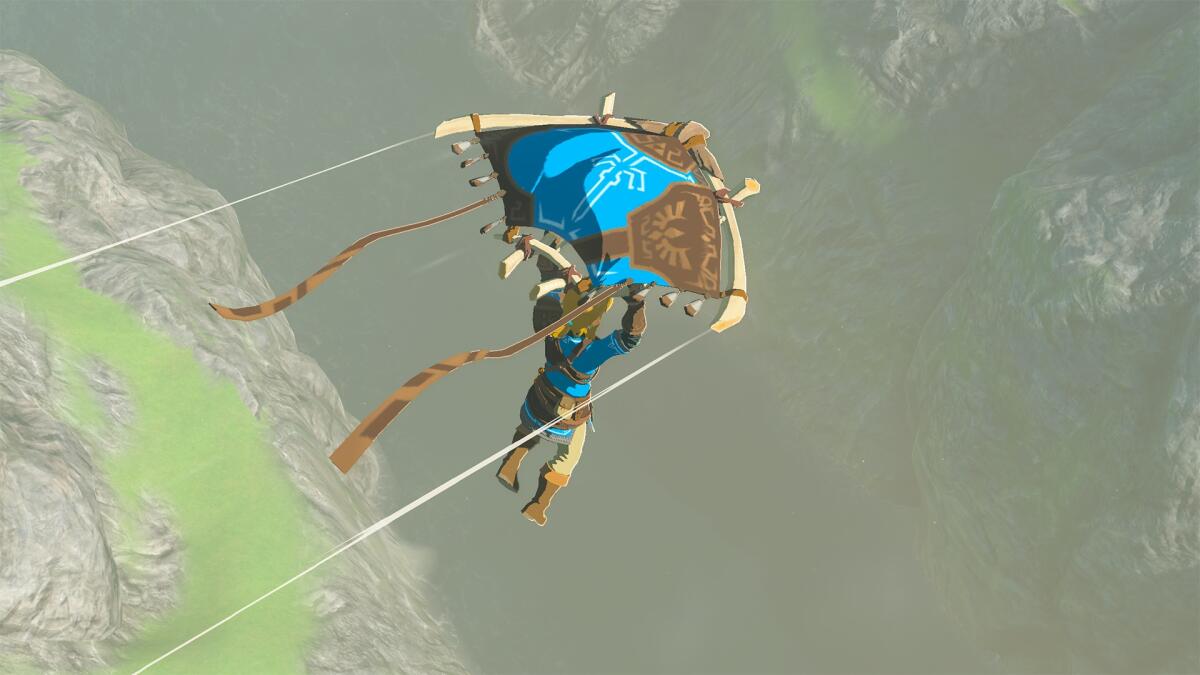
There’s much I haven’t even encountered, such as rockets, but “Tears of the Kingdom” is constantly throwing hints at players that there is more to uncover. Any piece of greenery — or guts from an enemy — can become an elixir or a meal when placed near a flame, but instead of giving us a laundry list of items to hunt, we’re rewarded by improvising with what we have. There’s a lot, in fact, to discover and remember. Some puzzles, found in egg-like shrines throughout the lands, had me slowed simply because I forgot that whacking certain objects could unleash their electricity-like powers. But even then, the game was propelling me to look at and rethink my surroundings. There are no dead ends as long as the player keeps asking questions of the game.
Back when “Breath of the Wild” was released, I logged more than 70 hours with the title, at times blowing off social engagements to try to discover its secrets. “Tears of the Kingdom,” once again overseen by longtime “Zelda” producer Eiji Aonuma, however, seems even more robust, more lived-in. Link never feels like he’s working alone here, as all of Hyrule is invested in where Zelda has been whisked away to.
Citizens will tell of sightings of her like she’s a deity prone to apparitions, and that will send Link off to another town in search of rumors of her whereabouts. But along the way we’ll encounter a host of diverting quests, the vast majority of them connected to Zelda’s disappearance or rebuilding Hyrule. Everything, such as going off and spending a few hours to investigate geoglyphs, propels Link forward, as we never know when a vision of Zelda will appear — or a newspaper journalist will have a new Zonai detail to share.
There’s just enough story to provide Link and the player with a constant sense of forward momentum, and each new detail is a nudge to a new direction and a new quest. Often while playing, I would wonder if “Tears of the Kingdom” was smarter than me, but that’s only when one of my solutions didn’t work. Ultimately, the game is never trying to confound or slow players, and that can make it appear unconventional. Instead of throwing down a challenge, this is a game in constant dialogue with the player.
“Tears of the Kingdom” doesn’t wait for us to solve a problem or best an enemy. It simply gives us a world, and then tells us to go forth and play.
'The Legend of Zelda: Tears of the Kingdom'
More to Read
The biggest entertainment stories
Get our big stories about Hollywood, film, television, music, arts, culture and more right in your inbox as soon as they publish.
You may occasionally receive promotional content from the Los Angeles Times.
